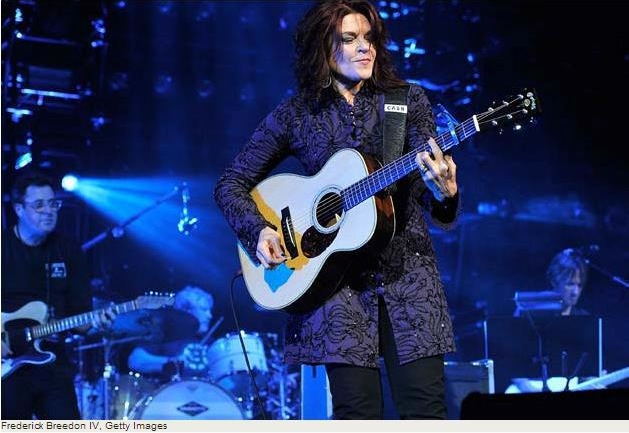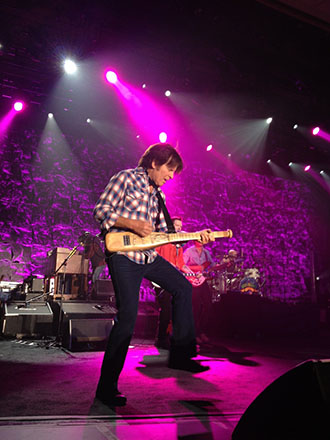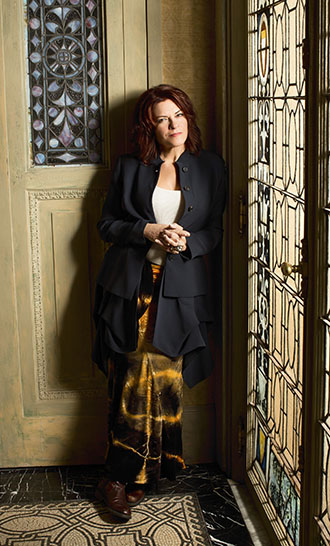 ROSANNE CASH & JOHN FOGERTY
ROSANNE CASH & JOHN FOGERTY
Journey South To Self-Discovery and Rediscovery
Do yourself a favor: If you get a chance to see Rosanne Cash’s show during her current The River & the Thread tour, grab it.
With a fabulous seven-piece backing band, she performs the entire album from start to finish, explaining each song and the concept behind them, as well as The River & the Thread as a whole, which resulted from a series of trips the longtime New York resident—with her husband, producer and guitarist/music director John Leventhal—took to her native South in a personal quest of self-discovery and rediscovery.
 As such, it brought to mind another landmark album, John Fogerty’s Blue Moon Swamp.
As such, it brought to mind another landmark album, John Fogerty’s Blue Moon Swamp.
The 1997 release was Fogerty’s first since his 1986 album Eye of the Zombie, the relatively lackluster follow-up to his chart-topping 1985 Centerfield, which had yielded the titletrack hit along with “The Old Man Down the Road” and “Rock and Roll Girls.”
Centerfield also notably included “Zanz Kant Danz,” which was believed by Fogerty’s nemesis Saul Zaentz—the late head of Creedence Clearwater Revival’s Fantasy Records, with whom he fought long and hard and bitterly over his contract with the label—to be a direct attack on his character, what with lines relating to a “little pig” named Zanz (like “Zanz can’t dance but he’ll steal your money).”
 Zaentz sued over the title and lyric, forcing Fogerty to change the “Zanz” name to “Vanz”; he also sued Fogerty for copyright infringement, claiming that the chorus of “The Old Man Down the Road” was the same as CCR’s “Run Through the Jungle.” Fogerty eventually won the suit, and a countersuit for attorney fees that went all the way to the U.S. Supreme Court.
Zaentz sued over the title and lyric, forcing Fogerty to change the “Zanz” name to “Vanz”; he also sued Fogerty for copyright infringement, claiming that the chorus of “The Old Man Down the Road” was the same as CCR’s “Run Through the Jungle.” Fogerty eventually won the suit, and a countersuit for attorney fees that went all the way to the U.S. Supreme Court.
But the litigation, and everything that preceded it, took a terrible emotional and financial toll on Fogerty, who refused to play CCR songs—thereby generating money for copyright owner Zaentz—from 1972 until a concert in Washington, D.C., for Vietnam veterans, on July 4, 1987.
“It was such a perversion of the spirit of what music should be about,” he told me on the eve of Blue Moon Swamp’s release. “It sounds naive now, but I was totally unprepared for all the negative things that happened—and lost the assuredness of knowing what I’m doing. I got confused and disjointed, and started on a quest without knowing why.”
 Like Cash, Fogerty’s quest took him South, in his case, to explore the deep rural roots of the blues—“my first huge influence” he said, stating what seemed to a longtime fan to be the obvious. But to my great surprise, he said he actually knew little about the blues beyond the urban blues giants. So he drove alone throughout the Mississippi Delta, and celebrated his 45th birthday standing outside Parchman Farm, the infamous Mississippi Prison of blues lore.
Like Cash, Fogerty’s quest took him South, in his case, to explore the deep rural roots of the blues—“my first huge influence” he said, stating what seemed to a longtime fan to be the obvious. But to my great surprise, he said he actually knew little about the blues beyond the urban blues giants. So he drove alone throughout the Mississippi Delta, and celebrated his 45th birthday standing outside Parchman Farm, the infamous Mississippi Prison of blues lore.
“Sometime after, I started recording the album—and it all started coming out of me!” Fogerty said, and did it ever: Blue Moon Swamp not only had plenty of the blues- and swamp-drenched roots rock music that had informed his music ever since Creedence, but also included “Joy of My Life,” his first-ever love song, and “Rambunctious Boy,” which his then label Warner Bros.’ Nashville division took to country radio.
The album went on to earn Fogerty his first Grammy award, for Best Rock Album. Rosanne Cash’s similar journey down south, as manifest in The River & the Thread, will likewise merit Grammy consideration, at the very least.
Jim Bessman



comment closed